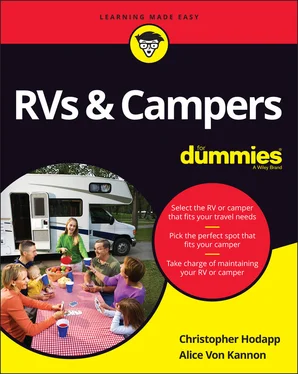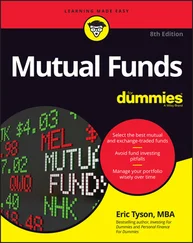 The Technical Stuff icon points out interesting information but not essential to understanding the subject at hand. If you’re in a hurry, you can skip anything marked with this icon.
The Technical Stuff icon points out interesting information but not essential to understanding the subject at hand. If you’re in a hurry, you can skip anything marked with this icon.
 The Remember icon marks stuff you probably should commit to memory or at least write on the back of your hand.
The Remember icon marks stuff you probably should commit to memory or at least write on the back of your hand.
 Anything marked with the Warning icon is important enough to warrant either a “Don’t do this!” or “Be sure to… .” We probably learned it the hard way, so you’re the lucky beneficiary of our bungling.
Anything marked with the Warning icon is important enough to warrant either a “Don’t do this!” or “Be sure to… .” We probably learned it the hard way, so you’re the lucky beneficiary of our bungling.
In addition to the material in the print or e-book you’re reading right now, this product also comes with some access-anywhere goodies on the web. Check out the free Cheat Sheet for a quick rundown of the different types of RVs and campers, tips on renting an RV, advice on what you can and can’t do in rest areas, and information on where to come for free. To access the Cheat Sheet, go to www.dummies.com and type RVs & Campers For Dummies Cheat Sheetin the Search box.
Visit our Facebook page at www.facebook.com/rvsfordummies for updates, videos, tips, tricks, and more.
Like all For Dummies books, ours is designed so you can read it from cover to cover. (We always advise everyone to buy one copy for every bathroom.) Or you can head straight for the topics you’re most interested in — use the table of contents and index to find what you need.
If you’re looking at motorhomes, you won’t need to read Chapter 7on tow vehicles. If you’re already familiar with the various types of RVs that are available, Chapter 2may bore you to smithereens. If you climb into your rig, turn on the power, and nothing happens, sit down at the picnic table and thumb your way to Chapter 14about electrical systems. It’s your book now, so use it as you see fit! There’s a lot of information stuffed into these pages.
Finally, before we jump in, a word of caution about this or any other book about RV ownership: Never make a potentially expensive purchase based solely on something you read in a book or online. Depending on your personal circumstances, investing in an expensive RV may very well be the biggest purchase you’ll ever make, with the possible exception of a house. We know everybody has their moments of weakness and susceptibility to pretty looks and a smooth line of patter, and your first RV can be a lot like your first teenage romantic crush: The heart wants what it wants. But throughout this book, we repeatedly urge you to avoid impulse buying and do lots of research before you hand over your hard-earned cash. You’ll be glad you did. Happy travels!
Part 1
Getting Started with RVs and Campers
IN THIS PART …
Discover the world of recreational vehicles (RVs) and life on the road.
Learn the difference between a trailer, a motorhome, a fifth wheel, and more.
Choose the rig that’s right for you, factoring in size, shape, arrangement, and price.
Chapter 1
Joining the Cavalcade of Rolling Nomads
IN THIS CHAPTER
 Becoming an American nomad
Becoming an American nomad
 Finding your kumpania
Finding your kumpania
 Getting your kicks on Route 66
Getting your kicks on Route 66
They’ve been known by different names over the last hundred years: campers, caravans, tin cans, trailers, Winnebagos, motorhomes, and RVs. There are teardrops and minis, pop-ups and tagalongs, fifth wheels and toy haulers, and motorhomes as small as vans and as big as buses.
When we were growing up, camper was the word for a shell on a pickup truck, while recreational vehicle (RV) was strictly something with its own engine, like a motorhome, and no single word fit everything you could camp in. Nowadays, both words are used more loosely. We had to pick one, and in this book, we chose to use RV as the best overall term for anything with wheels that you can eat and sleep and have fun in, including motorhomes, trailers, fifth wheels, and truck campers.
So, what sort of people have an RV? People just like you — and almost anybody else. Identifying a cross-section of RVers in order to define some “average” owner is as futile as trying to nail Jell-O to a wall. RVs are owned by campers and glampers, nomads and full-timers, homeschoolers and gig workers, loners and families, retirees and newlyweds, weekend warriors and tailgaters. Super-rich, middle-class, and flat-broke campers park side-by-side in campgrounds every day and then sit around each other’s campfires and share in the fellowship of RV life.
All the other chapters in this book are the how-to’s of RVing, from buying to boondocking to plumbing. But this first chapter is an overview of who’s RVing, why they’re doing it, and what effect it’s having on the culture. Friends and family, even acquaintances, ask us all the time, “What kind of people go RVing?” And, more commonly, “Why would you even consider living full time in an RV?” In this chapter, we try to answer both.
RVing is wrapped up with the romance of the open road. Sooner or later, the majority of RVers you encounter will say that they hit the highway because they wanted to actually see and explore the country around them. So, we talk about how and why those highways came about, why Route 66 is such a big deal to RVers, and why the United States, in particular, really is the land of the RV.
Perhaps life on the road as a modern nomad sounds like an exciting adventure you’d like to attempt. Or maybe you want to take your kids on one last great adventure as a family before your oldest goes off to college. Or if you’re older, maybe you want to bond with your grandkids by exploring the country together. Maybe you just saw a magazine photo of a couple gazing out the back window of their RV at the morning sunrise over a bucolic brook and started wishing it was you instead of them.
Despite a commonplace media image of RVers as either a vast platoon of elderly retirees or out-of-work, flinty nomads chasing day-labor jobs like the Oakies in the 1930s, the truth is that RVers come from every age, income, education level, and socioeconomic status.
Whether they intend to use an RV only for a couple of getaway weekends a year, live in one year-round, or anything in between, everybody has their own very personal reason for buying a trailer or motorhome. Over the years, we’ve heard these reasons most often:
You fondly recall a wonderful summer trip to the Grand Canyon as a child, when your family borrowed your uncle’s motorhome.
You’re getting close to retirement age and suddenly that three-bedroom house seems like way too much expense and responsibility to hang onto anymore.
You despise the four months of cold weather and shoveling 10 inches of partly cloudy off your front stoop every time it snows, but you otherwise love your sticks-and-bricks home the rest of the year.
Читать дальше

 The Technical Stuff icon points out interesting information but not essential to understanding the subject at hand. If you’re in a hurry, you can skip anything marked with this icon.
The Technical Stuff icon points out interesting information but not essential to understanding the subject at hand. If you’re in a hurry, you can skip anything marked with this icon. The Remember icon marks stuff you probably should commit to memory or at least write on the back of your hand.
The Remember icon marks stuff you probably should commit to memory or at least write on the back of your hand. Anything marked with the Warning icon is important enough to warrant either a “Don’t do this!” or “Be sure to… .” We probably learned it the hard way, so you’re the lucky beneficiary of our bungling.
Anything marked with the Warning icon is important enough to warrant either a “Don’t do this!” or “Be sure to… .” We probably learned it the hard way, so you’re the lucky beneficiary of our bungling. Becoming an American nomad
Becoming an American nomad










